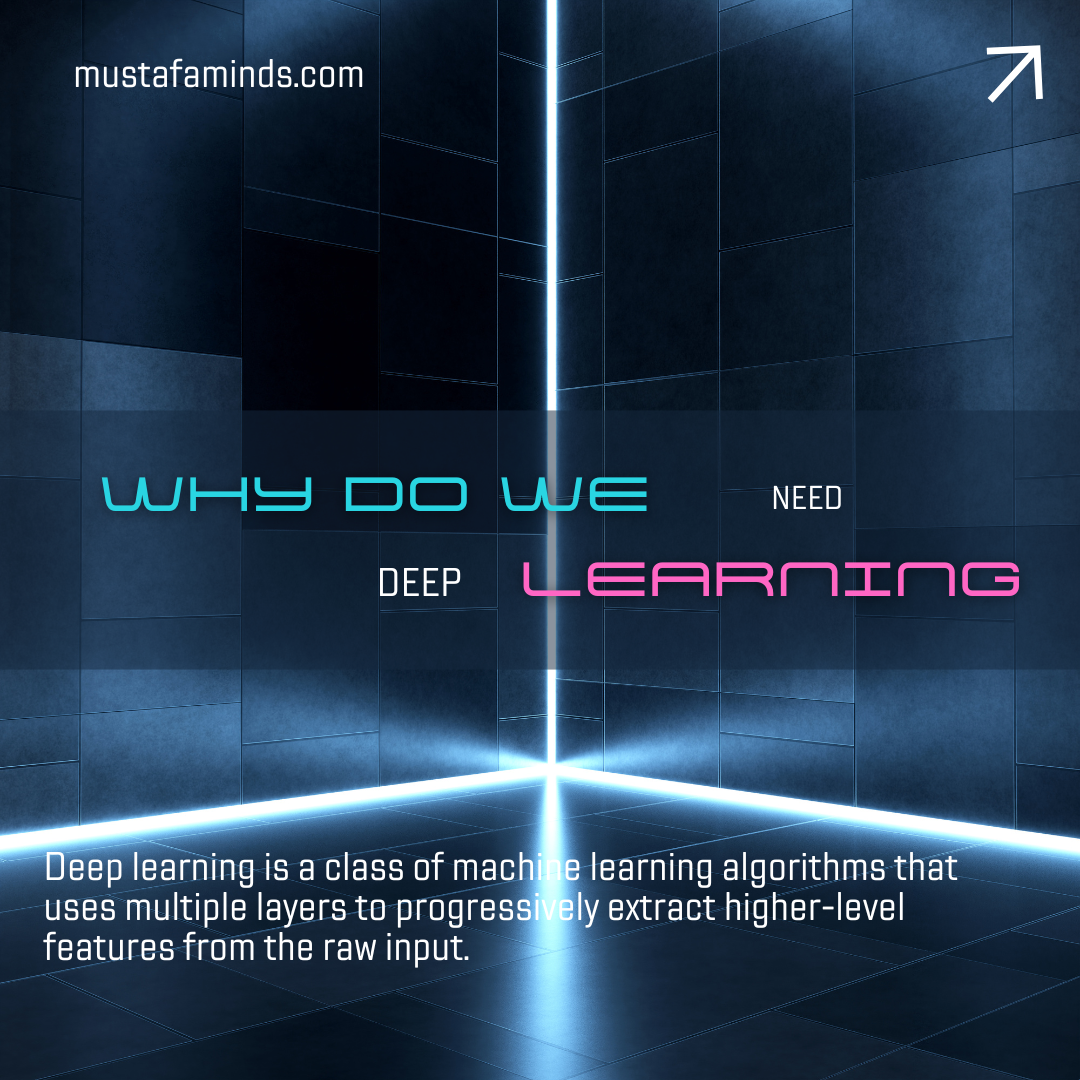Why do we need Deep Learning(DL) – Mustafa Minds
Introduction
In recent years, the term “deep learning” has become increasingly ubiquitous in discussions about technology, artificial intelligence (AI), and machine learning. From powering virtual assistants to revolutionizing healthcare diagnostics, deep learning has emerged as a transformative force across various industries. But what exactly is deep learning, and why do we need it? In this article, we’ll delve into the intricacies of deep learning, exploring its significance, applications, and why it’s indispensable in today’s world. Mustafa Minds
Understanding Deep Learning
Unlike traditional machine learning algorithms that require explicit instructions, deep learning models learn from vast amounts of data to identify patterns and extract meaningful insights autonomously.
- Unraveling Neural Networks: Deep learning(DL) relies on neural networks, computational models inspired by the structure and function of the human brain. These networks consist of interconnected layers of artificial neurons, each layer processing and transforming data at increasing levels of abstraction. Through a process called backpropagation, neural networks adjust their parameters iteratively to minimize prediction errors and improve accuracy.
- Harnessing Big Data: One of the defining features of deep learning(DL) is its voracious appetite for data. Deep learning algorithms thrive on large datasets, leveraging the sheer volume and diversity of information to uncover intricate patterns that might elude human perception. Whether it’s images, text, audio, or sensor data, deep learning can sift through massive amounts of information to extract actionable insights.
Applications of Deep Learning
The versatility of deep learning(DL) has propelled its adoption across a wide spectrum of industries, driving innovation and reshaping conventional practices. Let’s explore some compelling applications that underscore the importance of deep learning in today’s world.
- Healthcare Revolution: Deep learning(DL) holds immense promise in revolutionizing healthcare by enhancing diagnostics, predicting patient outcomes, and accelerating drug discovery. Medical imaging techniques, such as MRI and CT scans, benefit from deep learning algorithms capable of detecting anomalies and assisting radiologists in accurate diagnosis. Moreover, personalized treatment plans and genomic analysis are made possible through deep learning’s ability to analyze vast genomic datasets and identify genetic markers associated with diseases.
- Autonomous Vehicles: The development of autonomous vehicles hinges on deep learning algorithms for real-time perception, decision-making, and navigation. Through a combination of sensors, cameras, and sophisticated algorithms, self-driving cars can interpret their surroundings, anticipate potential hazards, and navigate complex road environments with remarkable precision. Deep learning enables continuous learning and adaptation, crucial for ensuring the safety and reliability of autonomous transportation systems.
- Natural Language Processing (NLP): Virtual assistants, chatbots, and language translation services leverage deep learning(DL) techniques to understand and generate human-like language. Natural language processing (NLP) algorithms process textual data, deciphering meaning, sentiment, and context to deliver accurate responses and facilitate seamless communication between humans and machines. As voice interfaces become increasingly prevalent, the role of deep learning in enabling natural language understanding and generation becomes even more pronounced.
- Financial Forecasting: Deep learning algorithms have found applications in financial forecasting, where they analyze market trends, predict stock prices, and identify trading opportunities. By analyzing historical data and real-time market feeds, deep learning models can discern complex patterns and correlations, providing valuable insights for investors and financial institutions. The ability to process vast amounts of financial data swiftly and accurately empowers decision-makers to navigate volatile markets with confidence.
Why Deep Learning Matters
Beyond its myriad applications, deep learning(DL) plays a pivotal role in addressing some of the most pressing challenges facing society today. Here’s why deep learning is indispensable in navigating the complexities of the modern world:
- Complexity and Uncertainty: The interconnected nature of global challenges, such as climate change, public health crises, and socioeconomic disparities, demands innovative solutions capable of navigating complexity and uncertainty. Deep learning(DL) excels in processing multifaceted data sources, uncovering hidden patterns, and informing evidence-based decision-making across diverse domains.
- Accelerating Innovation: Deep learning(DL) serves as a catalyst for innovation, driving advancements in fields ranging from healthcare and transportation to education and environmental conservation. By democratizing access to AI tools and knowledge, deep learning(DL) empowers researchers, entrepreneurs, and developers to explore new frontiers, iterate rapidly, and pioneer disruptive technologies that have the potential to transform lives.
- Empowering Human Potential: While there are concerns about the impact of AI on employment and society, deep learning has the potential to augment human capabilities rather than replace them. By automating routine tasks, optimizing processes, and augmenting decision-making, deep learning frees up human talent to focus on creative problem-solving, innovation, and value-added activities that require empathy, intuition, and ingenuity.
Conclusion
In conclusion, deep learning(DL) represents a paradigm shift in how we leverage data, algorithms, and computing power to tackle complex challenges and unlock new opportunities. From healthcare and transportation to finance and beyond, the applications of deep learning are vast and transformative. As we navigate an increasingly interconnected and data-driven world, the need for deep learning expertise and innovation has never been more apparent. By embracing the potential of deep learning and harnessing its capabilities responsibly, we can chart a course toward a future where technology serves as a force for good, empowering individuals and enriching societies worldwide. Mustafa Minds
For more information Click here

